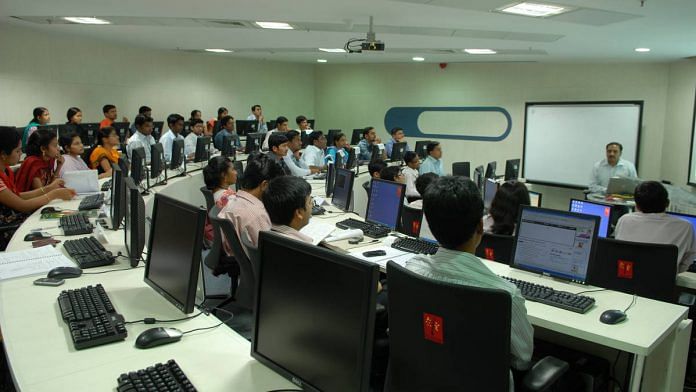HRD ministry is expected to soon approve regulations granting these institutions more autonomy to frame admission policy, curriculum and admit foreign faculty.
New Delhi: India’s top business schools and other standalone institutions are all set to get greater autonomy in admissions, curriculum and hiring of foreign faculty, ThePrint has learnt.
The Modi government is likely to facilitate this process soon by approving the All India Council for Technical Education (Categorization of Standalone Institutions for Grant of Graded Autonomy) Regulations, 2018.
The move is aimed at granting the standalone institutions more freedom and is also a recognition of their performance.
Some of the top business schools that are likely to benefit from the move include XLRI, Jamshedpur, the SP Jain Institute of Management and Research, Mumbai, and the MDI Gurgaon.
The regulations were approved by the All India Council for Technical Education (AICTE) in August and were forwarded to the Ministry of Human Resource Development (HRD) for concurrence. The HRD ministry is expected to approve them soon.
Also read: In new engineering course: Wright brothers didn’t invent plane, batteries existed in Vedic age
The standalone institutions
Standalone institutions refer to those that are not universities and not affiliated to any of the universities. They impart courses through regular or through Open and Distance Learning Systems.
The institutes offer their own diploma, post-diploma, postgraduate diploma and postgraduate certificates in management and allied areas, computer applications and travel and tourism with the approval of AICTE.
As per the proposed regulations, a copy of which is with ThePrint, the AICTE will categorise these standalone institutions into three categories — category I, II, and III — based on certain parameters.
A standalone institution will be eligible for the category I status if it has been accredited by National Board of Accreditation (NBA) with a score of 750 or above on a scale of 1000 or above.
For category II, an institute should have an NBA score of 700 and above. Category II standalone institutions will enjoy most of the autonomy accorded to category I except that they will have to undergo AICTE inspections.
The rest of the standalone institutions will be classified under category III and will not enjoy any of these benefits.
Autonomy for category I institutions
Institutes under category I will be eligible for grants and will also be exempt from AICTE inspections. They can start a new course/programme in disciplines that form a part of its existing academic framework without AICTE approval.
The courses, however, have to be “relevant to local, national or international needs”, and the institutes will have to pass on the information to AICTE.
The institutes can also start skill courses, consistent with the National Skills Qualification Framework, without AICTE approval. They can also open research parks, incubation centres, institute-society linkage centres, in self-financing mode, either on its own or in partnership with private partners, without AICTE approval.
“However, in all such arrangements, the ownership of all immovable property and that component of movable property procured through the resources of the institution will remain with the standalone institution,” the rules state.
Hiring foreign faculty, admitting foreign students
The category I and category II institutions can hire foreign faculty without AICTE approval but the recruitment will be subject to other government rules, regulations and guidelines.
The hiring can only be up to 20 per cent over and above the institute’s total sanctioned faculty strength.
The foreign faculty, however, should have taught at any institution appearing in top 500 of any of the world-renowned ranking framework such as the Times Higher Education World University Rankings or the QS Rankings.
Also read: 17.68 lakh seats lay vacant last year but govt may approve 800 new tech institutes in 2018
The institutes will also have the freedom to hire foreign faculty on “tenure/contract” basis as per the terms and conditions approved by their governing council/statutory bodies.
They will be free to admit foreign students on merit, subject to a maximum of 20 per cent, over and above of the strength of their approved domestic students. They will be free to fix and charge fees from foreign students without any restriction.
“These institutions while following the pay scales as laid down by the AICTE, can build in an incentive structure to attract talented faculty, with the condition that the incentive structure shall have to be paid from their own revenue sources and not from AICTE or the government funds,” the rules state.



